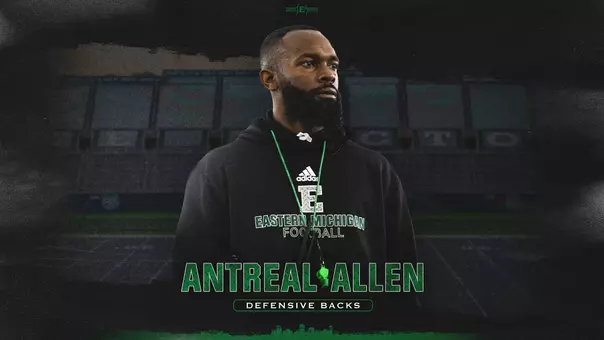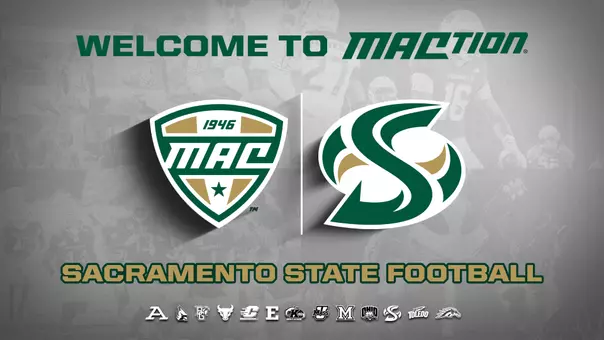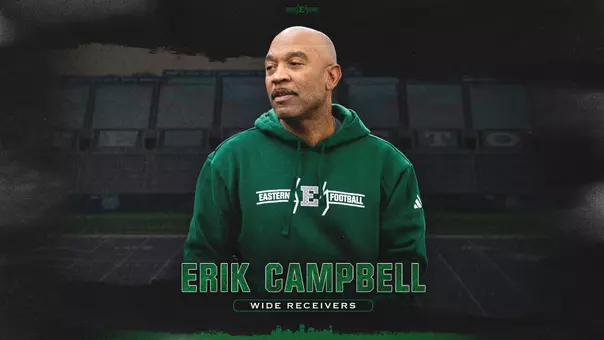Eastern Michigan Athletics

A Walk Through History: Trailblazer U? True at EMU
11/22/2019 11:30:00 AM | Football, Engagement
Author T.C. Cameron tells unknown tales from EMU Football's Past
Previous Stories: 1. 2. 3. 4. 5.
YPSILANTI, Mich. (EMUEagles.com) -- It's a moment that changed me and how I viewed college athletics.
In January of 1993, Eastern Michigan was moments away from introducing Ron Cooper as their first African-American football coach at a basketball game at Bowen Field House.
Standing in front of a few hundred African-American students seated where the sideline met the baseline, Cooper asked: "T.C., are those my players?"
I told him no, but Cooper persisted, "Are you sure?" then added, "At most schools, the blacks are always the athletes."
While I washed the naiveté out of my mouth, a wry smile curled Cooper's lip. He wasn't asking a question; he was telling me: "This opportunity isn't always available for people who look like me."
Ypsilanti is an unlikely description of an oasis, but for minority candidates looking for the opportunity to lead within collegiate sports, that's exactly what Eastern Michigan has been for over four decades.
It's just another reason why athletics matters so much at EMU. At Eastern, football has served as a powerful vehicle of inclusion in Division I athletics. Many schools have yet to hire anyone of minority orientation for any high-profile leadership; EMU's commitment includes three black football coaches, two African-American and four female athletic directors, as well as African-American hires in men's and women's basketball, and baseball, too.
"It was obvious during the hiring process the people leading Eastern wanted to be different and wanted to do things differently," said Cooper, now the defensive backs coach at Arkansas.
The realities Cooper shared with me 25 years ago resurfaced last weekend, when Arkansas athletic director Hunter Yurachek fired football coach Chad Morris. Cooper, with previous head coaching experience at EMU, Louisville, Florida International and Alabama A&M, seemed like an obvious choice to lead the final two games of the season.
Instead, the job went to special teams coach Barry Lunney, Jr., the Razorbacks' special teams coordinator, who has no coaching experience. When I asked the school's sports information office if Cooper had been considered, I was reminded Yurachek cited Lunney's deep ties to the program in justifying the appointment.
Lunney was quarterback at Arkansas during Cooper's stint at EMU.
A road less traveled
EMU's success in minority hiring defies almost all trends within major college athletics across the country. In 2018, sans HBCU schools, there were just 12 African-American FBS head coaches in 2018 — or nine percent of the 129 programs in FBS football — even though African-Americans make up almost 50 percent of FBS rosters. Worse, there were just 30 black head coaches at all levels of NCAA football out of 624 available positions, an unfathomable 4.8 percent.
Contrast that to Eastern's commitment to equitable hiring, never more evident than in 2010 when Dr. Derrick Gragg was athletic director, Ron English was football coach, Rob Murphy was the men's basketball coach, AnnMarie Gilbert was the women's basketball coach and Jay Alexander was baseball coach, while Sue Martin was leading EMU as president.
"When I interviewed, I felt Eastern was only interested in who was best-suited to succeed with their student-athletes," Cooper said. "Look at Gene Smith and Derrick Gragg — both were in their young 30s when they went to EMU — people in charge at Eastern are ahead in the thought-process at most schools in terms of what's best for the university and the student-athlete."
Change starts at the top
The diversity in leadership EMU sought started in 1979, when it hired John Porter as the school's first African-American president and 17th overall. A former star basketball player at Albion College, Porter had made his name nationally as Michigan's state superintendent for public education. Simultaneously, he was the nation's youngest chief state schools officer and the first African-American to serve as any state's head of schools.
It was Porter who hired Gene Smith as EMU's first black athletic director in 1986. A national champion as a football player and coach at Notre Dame, Smith accomplished something no athletic director has matched: winning a pair of Reese Trophies as the MAC's top men's athletic department, in 1987-88 and 1990-91.
But in December of 1992, a tsunami of circumstances threatened Smith's successes, and the challenges he faced cannot be overstated.
Bowen Field House was home to as many as nine different teams, all fighting for practice or competition time. It boasted the nation's smallest varsity locker rooms, and what most schools would call a storage room was a weight training room at Eastern. The physical footprint for varsity athletics was so small, EMU often had to cram teams into Warner or the REC-IM.
Imagine EMU athletics without the Convocation Center, the St. Joe's Sport Dome, the spectacular training center at the north end of of the stadium or the relationship with adidas as a thoughtful, consistent brand partner.
What did exist was a football program with just six wins in 33 previous games and a giant chasm within EMU's fan base in the aftermath of the nickname change from Hurons to Eagles.
Divergent pathways earn the spotlight
The calamities Smith faced became omnipresent nationally when Eastern welcomed Temple to Rynearson Sept. 9, 1993.
Cooper's hire would have been big news on two different fronts anyway. At 32, he was the youngest head coach in Division I football, and Eastern plucking the associate head coach from Notre Dame was big news, too. But through uncanny circumstance, the Eastern-Temple game became just the second time two black head coaches would square off in an FBS game.
Cooper's hire was sandwiched by two other African-American hires, Ron Dickerson at Temple and Jim Caldwell at Wake Forest. Because college football game contracts are agreed to several years in advance of the game, no one could have foreseen how a confluence of unrelated events was destined to thrust Eastern into the national spotlight like no other game in Rynearson Stadium's history.
Some 200 journalists descended onto Ypsilanti for the historic event. While it was a moment to celebrate for two coaches and two schools, it was moment of shame for the rest of the country, a reminder of what remains a national embarrassment 25 years later: the lack of minorities holding head coaching positions within all levels of college football. In 1992, there wasn't a black head coach in major college football, despite African-American players comprising 45 percent of FBS rosters. That three were hired within a matter of days preceding the 1993 season was huge news, even though they collectively comprised less than three percent of head coaches within what was then 106 FBS programs.
On the field that night, Temple escaped with a 31-28 win, and Cooper remains pained by the key sequence that decided the outcome.
"We had a 21-17 lead in the third quarter and we went for the kill with a punt block," Cooper said. "We didn't get the ball, hit their punter, and they drove for the go-ahead score. But I also remember our kids kept fighting and we got the program turned back around."
The Eagles went on to win four straight games for the first time since 1988-89, and won at Central Michigan for the first time as a MAC/Division I school.
After another four-game win streak in 1994, Cooper accepted requests to interview at Iowa State (where Gene Smith had relocated) and Vanderbilt before ultimately accepting the head coach's position at Louisville. His final game at EMU was Charlie Batch's coronation, Batch coming off the bench to throw four touchdowns, the final score coming on the last play of the game to beat Toledo.
"That win was what everyone talked about in all those interviews," Cooper said, "but there's no doubt I should have stayed longer. I should have enjoyed the full stretch of Charlie Batch."
The one who got away
It's fair to say Al Lavan is the most under-recognized coach in the program's history.
It's not uncommon for assistant coaches to work in virtual anonymity, and despite an astounding career as an assistant coach with six other schools and five NFL teams before coming to EMU in 2002, few knew Lavan's name in 2003 when he was named EMU's coach for the final three games of the season.
In wins over Central Florida and Ball State, Anthony Sherrell set single-game rushing attempts record with 43 carries in each victory.
Like Lloyd Carr, an EMU assistant coach in 1976-77, Lavan leveraged his short stint at Eastern into the head coaching position at Delaware State. Over the next eight years, Lavan rebuilt a dormant program, going 41-37 overall and 34-21 in the Mid-Eastern Athletic Conference. In 2007, Lavan's team won the MEAC title for the first time in 16 years, going 10-2 and earning a trip to the FCS playoffs. The Hornets lost that first-ever matchup with Delaware, but Lavan, who won the 1990 Super Bowl with San Francisco, is credited with making possible what's now an annual, regular-season game between the two schools.
He passed away in 2018.
There's no hard and fast record-keeping of the minority hiring across all sports and all school — the NCAA only reaches back 10 years and that data primarily serves football and basketball— but it's safe to say Eastern Michigan is unrivaled when it comes to hiring candidates of minority orientation.
"Eastern Michigan is far, far beyond the spectrum of hiring minorities, because they haven't just hired one or two minorities, they've hired several, across multiple sports and among multiple minorities in leadership positions," Cooper said, "You better believe I still follow and root for Eastern Michigan. It's a special place."
— T.C. Cameron is the author of Miracle Maples (2019) and Navy Football: Return to Glory (2017). A 1995 graduate of EMU, he's lived in Annapolis, MD since 2009. Follow him on Twitter: @ByTCCameron.
YPSILANTI, Mich. (EMUEagles.com) -- It's a moment that changed me and how I viewed college athletics.
In January of 1993, Eastern Michigan was moments away from introducing Ron Cooper as their first African-American football coach at a basketball game at Bowen Field House.
Standing in front of a few hundred African-American students seated where the sideline met the baseline, Cooper asked: "T.C., are those my players?"
I told him no, but Cooper persisted, "Are you sure?" then added, "At most schools, the blacks are always the athletes."
While I washed the naiveté out of my mouth, a wry smile curled Cooper's lip. He wasn't asking a question; he was telling me: "This opportunity isn't always available for people who look like me."
Ypsilanti is an unlikely description of an oasis, but for minority candidates looking for the opportunity to lead within collegiate sports, that's exactly what Eastern Michigan has been for over four decades.
It's just another reason why athletics matters so much at EMU. At Eastern, football has served as a powerful vehicle of inclusion in Division I athletics. Many schools have yet to hire anyone of minority orientation for any high-profile leadership; EMU's commitment includes three black football coaches, two African-American and four female athletic directors, as well as African-American hires in men's and women's basketball, and baseball, too.
"It was obvious during the hiring process the people leading Eastern wanted to be different and wanted to do things differently," said Cooper, now the defensive backs coach at Arkansas.
The realities Cooper shared with me 25 years ago resurfaced last weekend, when Arkansas athletic director Hunter Yurachek fired football coach Chad Morris. Cooper, with previous head coaching experience at EMU, Louisville, Florida International and Alabama A&M, seemed like an obvious choice to lead the final two games of the season.
Instead, the job went to special teams coach Barry Lunney, Jr., the Razorbacks' special teams coordinator, who has no coaching experience. When I asked the school's sports information office if Cooper had been considered, I was reminded Yurachek cited Lunney's deep ties to the program in justifying the appointment.
Lunney was quarterback at Arkansas during Cooper's stint at EMU.
A road less traveled
EMU's success in minority hiring defies almost all trends within major college athletics across the country. In 2018, sans HBCU schools, there were just 12 African-American FBS head coaches in 2018 — or nine percent of the 129 programs in FBS football — even though African-Americans make up almost 50 percent of FBS rosters. Worse, there were just 30 black head coaches at all levels of NCAA football out of 624 available positions, an unfathomable 4.8 percent.
Contrast that to Eastern's commitment to equitable hiring, never more evident than in 2010 when Dr. Derrick Gragg was athletic director, Ron English was football coach, Rob Murphy was the men's basketball coach, AnnMarie Gilbert was the women's basketball coach and Jay Alexander was baseball coach, while Sue Martin was leading EMU as president.
"When I interviewed, I felt Eastern was only interested in who was best-suited to succeed with their student-athletes," Cooper said. "Look at Gene Smith and Derrick Gragg — both were in their young 30s when they went to EMU — people in charge at Eastern are ahead in the thought-process at most schools in terms of what's best for the university and the student-athlete."
Change starts at the top
The diversity in leadership EMU sought started in 1979, when it hired John Porter as the school's first African-American president and 17th overall. A former star basketball player at Albion College, Porter had made his name nationally as Michigan's state superintendent for public education. Simultaneously, he was the nation's youngest chief state schools officer and the first African-American to serve as any state's head of schools.
It was Porter who hired Gene Smith as EMU's first black athletic director in 1986. A national champion as a football player and coach at Notre Dame, Smith accomplished something no athletic director has matched: winning a pair of Reese Trophies as the MAC's top men's athletic department, in 1987-88 and 1990-91.
But in December of 1992, a tsunami of circumstances threatened Smith's successes, and the challenges he faced cannot be overstated.
Bowen Field House was home to as many as nine different teams, all fighting for practice or competition time. It boasted the nation's smallest varsity locker rooms, and what most schools would call a storage room was a weight training room at Eastern. The physical footprint for varsity athletics was so small, EMU often had to cram teams into Warner or the REC-IM.
Imagine EMU athletics without the Convocation Center, the St. Joe's Sport Dome, the spectacular training center at the north end of of the stadium or the relationship with adidas as a thoughtful, consistent brand partner.
What did exist was a football program with just six wins in 33 previous games and a giant chasm within EMU's fan base in the aftermath of the nickname change from Hurons to Eagles.
Divergent pathways earn the spotlight
The calamities Smith faced became omnipresent nationally when Eastern welcomed Temple to Rynearson Sept. 9, 1993.
Cooper's hire would have been big news on two different fronts anyway. At 32, he was the youngest head coach in Division I football, and Eastern plucking the associate head coach from Notre Dame was big news, too. But through uncanny circumstance, the Eastern-Temple game became just the second time two black head coaches would square off in an FBS game.
Cooper's hire was sandwiched by two other African-American hires, Ron Dickerson at Temple and Jim Caldwell at Wake Forest. Because college football game contracts are agreed to several years in advance of the game, no one could have foreseen how a confluence of unrelated events was destined to thrust Eastern into the national spotlight like no other game in Rynearson Stadium's history.
Some 200 journalists descended onto Ypsilanti for the historic event. While it was a moment to celebrate for two coaches and two schools, it was moment of shame for the rest of the country, a reminder of what remains a national embarrassment 25 years later: the lack of minorities holding head coaching positions within all levels of college football. In 1992, there wasn't a black head coach in major college football, despite African-American players comprising 45 percent of FBS rosters. That three were hired within a matter of days preceding the 1993 season was huge news, even though they collectively comprised less than three percent of head coaches within what was then 106 FBS programs.
On the field that night, Temple escaped with a 31-28 win, and Cooper remains pained by the key sequence that decided the outcome.
"We had a 21-17 lead in the third quarter and we went for the kill with a punt block," Cooper said. "We didn't get the ball, hit their punter, and they drove for the go-ahead score. But I also remember our kids kept fighting and we got the program turned back around."
The Eagles went on to win four straight games for the first time since 1988-89, and won at Central Michigan for the first time as a MAC/Division I school.
After another four-game win streak in 1994, Cooper accepted requests to interview at Iowa State (where Gene Smith had relocated) and Vanderbilt before ultimately accepting the head coach's position at Louisville. His final game at EMU was Charlie Batch's coronation, Batch coming off the bench to throw four touchdowns, the final score coming on the last play of the game to beat Toledo.
"That win was what everyone talked about in all those interviews," Cooper said, "but there's no doubt I should have stayed longer. I should have enjoyed the full stretch of Charlie Batch."
The one who got away
It's fair to say Al Lavan is the most under-recognized coach in the program's history.
It's not uncommon for assistant coaches to work in virtual anonymity, and despite an astounding career as an assistant coach with six other schools and five NFL teams before coming to EMU in 2002, few knew Lavan's name in 2003 when he was named EMU's coach for the final three games of the season.
In wins over Central Florida and Ball State, Anthony Sherrell set single-game rushing attempts record with 43 carries in each victory.
Like Lloyd Carr, an EMU assistant coach in 1976-77, Lavan leveraged his short stint at Eastern into the head coaching position at Delaware State. Over the next eight years, Lavan rebuilt a dormant program, going 41-37 overall and 34-21 in the Mid-Eastern Athletic Conference. In 2007, Lavan's team won the MEAC title for the first time in 16 years, going 10-2 and earning a trip to the FCS playoffs. The Hornets lost that first-ever matchup with Delaware, but Lavan, who won the 1990 Super Bowl with San Francisco, is credited with making possible what's now an annual, regular-season game between the two schools.
He passed away in 2018.
There's no hard and fast record-keeping of the minority hiring across all sports and all school — the NCAA only reaches back 10 years and that data primarily serves football and basketball— but it's safe to say Eastern Michigan is unrivaled when it comes to hiring candidates of minority orientation.
"Eastern Michigan is far, far beyond the spectrum of hiring minorities, because they haven't just hired one or two minorities, they've hired several, across multiple sports and among multiple minorities in leadership positions," Cooper said, "You better believe I still follow and root for Eastern Michigan. It's a special place."
— T.C. Cameron is the author of Miracle Maples (2019) and Navy Football: Return to Glory (2017). A 1995 graduate of EMU, he's lived in Annapolis, MD since 2009. Follow him on Twitter: @ByTCCameron.
Motor City MACtion: Eastern Michigan-Central Michigan Football to Play at Ford Field
Wednesday, January 21
He's Back! Kim Granted Extra Year of Eligibility, Set to Return for 2026 Season
Wednesday, January 07
National Signing Day - Behind the Scenes
Wednesday, December 03
2026 EMU Football Early Signing Day Show
Wednesday, December 03




